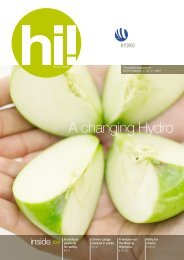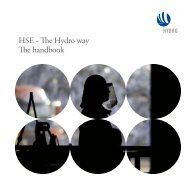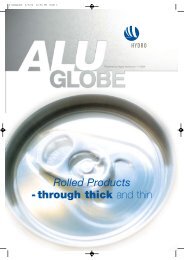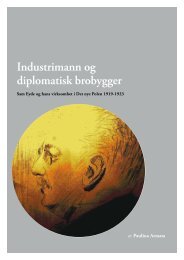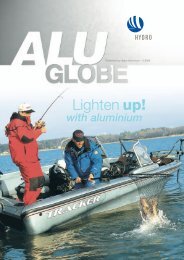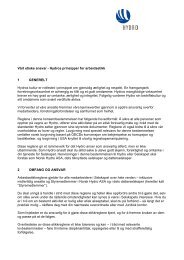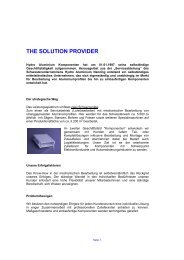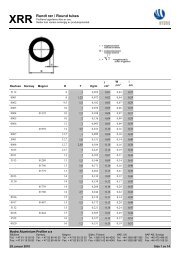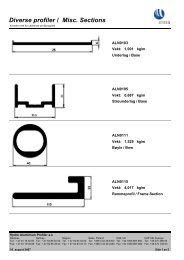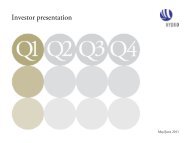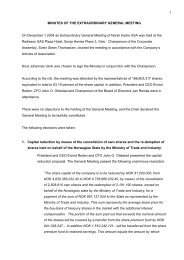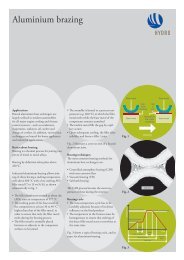Hydro Annual Report 2011b
Hydro Annual Report 2011b
Hydro Annual Report 2011b
You also want an ePaper? Increase the reach of your titles
YUMPU automatically turns print PDFs into web optimized ePapers that Google loves.
• Secure stable production and first-quartile cost position of<br />
Qatalum and optimize the commercial value of full<br />
production volumes<br />
• Improve returns for downstream operations<br />
• Maintain capital discipline<br />
<strong>Hydro</strong> will take the steps necessary to secure its operating results<br />
and sound financial position in 2012 and safe operations continues<br />
to be of paramount importance. Zero tolerance for fatal<br />
accidents continues, and <strong>Hydro</strong> is aiming for a 25 percent<br />
reduction in total recordable injuries per million hours worked<br />
or a TRI rate of 2.9 for 2012. following the significant business<br />
expansion in 2011, <strong>Hydro</strong> has revised several important corporate<br />
responsibility strategies that will be on the top of the board’s<br />
agenda for implementation in 2012. These include reducing the<br />
company’s environmental footprint, helping customers reduce<br />
their footprint and improving the environmental qualities of<br />
aluminium as a material. <strong>Hydro</strong>’s overall CSR strategy is built<br />
upon four pillars: integrity and anti-corruption, community<br />
and stakeholder engagement, human rights, and supply chain<br />
and product stewardship. five priorities for <strong>Hydro</strong>’s people<br />
strategy include: performance culture, competence management,<br />
leadership pipeline, diversity and mobility.<br />
further improving the capacity utilization and efficiency of the<br />
company’s new Bauxite & Alumina operations will be a key priority<br />
in 2012. <strong>Hydro</strong> will concentrate on increasing the effectiveness<br />
of its production systems, raising productivity and<br />
pursuing a more systematic execution and follow-up of maintenance<br />
activities. <strong>Hydro</strong>’s aim is to achieve targeted increases in<br />
production levels and to significantly enhance the performance<br />
within these core activities.<br />
<strong>Hydro</strong> will continue to emphasize improving the efficiency of its<br />
smelter portfolio while constantly addressing the cost challenges<br />
facing its Primary Metal business. <strong>Hydro</strong>’s USD 300 per mt cost<br />
improvement program is on track, delivering cumulative saving<br />
of USD 200 per mt by the end of 2011.<br />
Improving returns for <strong>Hydro</strong>’s downstream operations will be<br />
an important issue on the company’s agenda in 2012. Key strategies<br />
include differentiation through innovation and service as<br />
well as continuous cost reduction to secure margins while protecting<br />
market shares. <strong>Hydro</strong> plans to build upon its European<br />
extrusion operations and its world-class rolling mills, focusing<br />
on the high-end product markets. Strong cost control will be a<br />
key objective in general and the company will continue efforts<br />
to turn around activities in southern Europe, working towards a<br />
leaner organization, and securing significant and lasting reductions<br />
in operating costs.<br />
<strong>Hydro</strong> aims to provide its shareholders competitive returns<br />
compared to alternative investments in peer companies, and is<br />
maintaining its dividend policy of paying 30 percent of net<br />
income in ordinary dividends over the business cycle. The com-<br />
BoArD oF DIreCtors’ report<br />
Investor information<br />
11<br />
pany will continue to focus on securing its financial position<br />
through exercising capital discipline to secure an optimal level of<br />
operating capital, and to maintain a sustainable level of capital<br />
expenditures safeguarding the company’s operating portfolio.<br />
Strong cash generation and preserving <strong>Hydro</strong>’s investment grade<br />
credit rating will be key priorities.<br />
Shaping the future<br />
<strong>Hydro</strong> is well prepared for the opportunities ahead in an industry<br />
with attractive long-term fundamentals. However, the current<br />
economic environment represents a significant challenge in<br />
obtaining a satisfactory return on capital for the industry as a<br />
whole and for <strong>Hydro</strong>. In order to secure the viability of its operations<br />
over time, <strong>Hydro</strong> intends to focus on initiatives and business<br />
opportunities that continually improve its cost position.<br />
<strong>Hydro</strong>’s long alumina equity position places it in a market where<br />
we can benefit from mechanisms that will evolve the price of the<br />
company’s core products to better reflect the cost fundamentals<br />
of the industry. <strong>Hydro</strong>’s long-term ambition is to increase its<br />
capacity of low-cost alumina, reinforcing its position as a leading<br />
global supplier. Potential projects include CAP, an alumina<br />
refinery in Barcarena, close to Alunorte, and the possible expansion<br />
of the Paragominas mine.<br />
The Qatalum smelter has been developed with the possibility to<br />
more than double the plant’s annual capacity in the future.<br />
There is also a possibility to expand the low-cost Alouette smelter<br />
in Canada. <strong>Hydro</strong> intends to maintain its technological leadership<br />
which contributes to lower operating costs, reduced emissions<br />
and ensures attractiveness as a partner for world-class<br />
projects. Selective growth of the company’s downstream operations<br />
in emerging markets including Brazil and China will be a<br />
priority going forward.<br />
<strong>Hydro</strong> intends to develop the value of its Norwegian energy<br />
assets and to use <strong>Hydro</strong>’s competence to secure competitive<br />
energy sources for its global activities. <strong>Hydro</strong> is committed to<br />
maintaining the viability of the company’s global smelter portfolio,<br />
which is heavily dependent on securing adequate supplies<br />
of competitively priced energy. Securing long-term, competitive<br />
power sources is of critical importance to sustaining the viability<br />
of <strong>Hydro</strong>’s smelter portfolio in Norway. Identifying opportunities<br />
for long-term, competitive energy sources to protect and<br />
develop the company’s portfolio, taking into consideration<br />
license reversion in Norway and emission legislation in general,<br />
continues to be an important priority for <strong>Hydro</strong>.<br />
Investor information<br />
<strong>Hydro</strong>’s share price closed at NOK 27.74 at the end of 2011.<br />
The return for 2011 was negative, amounting to NOK 14.87<br />
per share, or 35 percent.<br />
<strong>Hydro</strong>’s board of directors proposes to pay a dividend of NOK<br />
0.75 per share for 2011 reflecting the company’s strong com-



